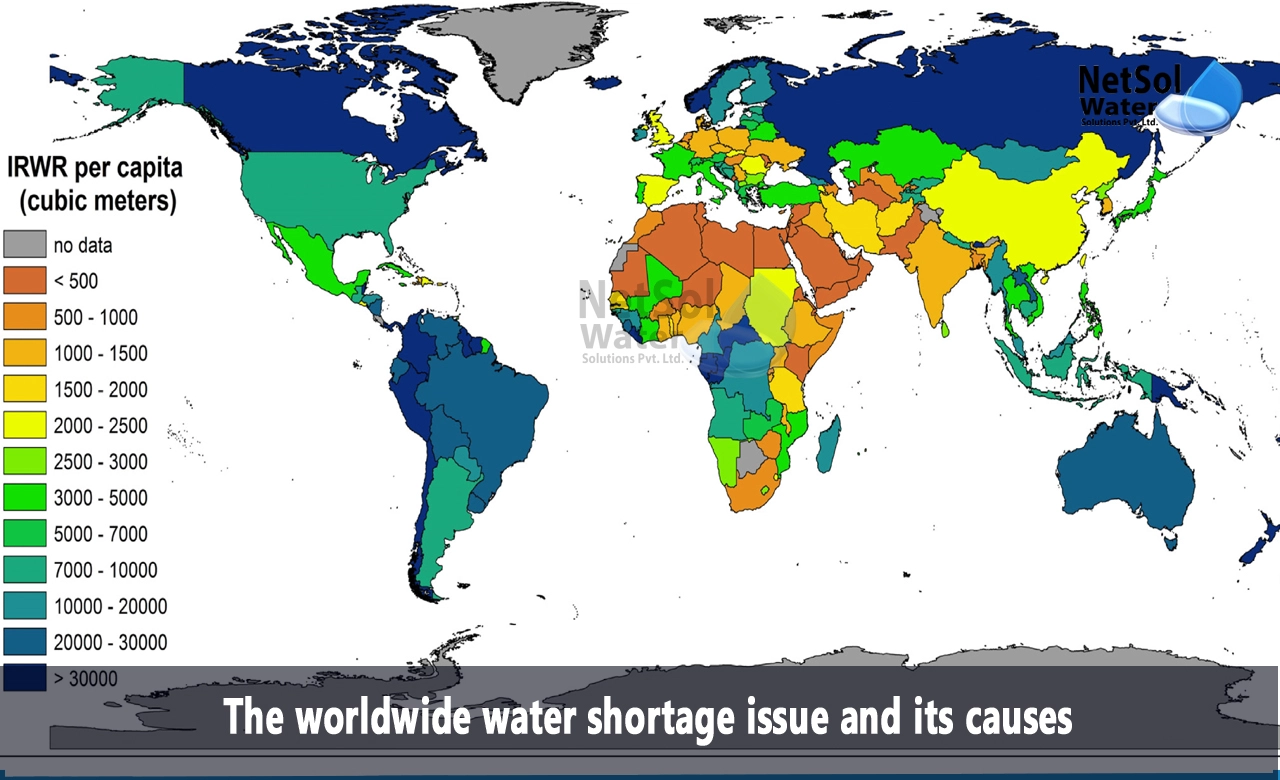Water Scarcity: The Looming Crisis and Potential Solutions
Water is ostensibly the main regular asset on the planet. Without it, life as far as we might be concerned wouldn't exist. Notwithstanding, in spite of water covering more than 70% of the planet's surface, freshwater reasonable for human use and utilization is unimaginably scant. As the worldwide populace increments dramatically, so does the interest for clean water. This has prompted an approaching emergency that undermines the wellbeing and occupations of billions around the world. In this blog entry, we will look at the extent of the worldwide water shortage issue, its significant causes, and potential arrangements that can assist mankind with staying away from disaster.
The Scale of the Crisis
As per the Unified Countries, more than 2 billion individuals at present live in nations encountering high water pressure. This implies the interest for water surpasses the sum accessible during a specific period. By 2025, it is assessed that around 1.8 billion individuals will live in regions tormented by water shortage, with 66% of the total populace living in water-focused districts.
Several factors contribute to dwindling freshwater supplies globally. Rising populations increase agricultural and industrial demands. Pollution from human activities contaminates available freshwater. Climate change disrupts weather patterns, causing droughts or floods that further deplete or contaminate water resources. Unless dramatic action is taken to curb water consumption and waste, we risk severe water shortages within our lifetimes.
Consequences of Inaction
The consequences of water scarcity are vast and can be catastrophic. Insufficient access to clean water leads to poor sanitation, fueling the spread of diseases. Dehydration and famine may arise, endangering lives. Disputes over shared water resources could escalate political tensions. Mass migration might follow as people abandon regions no longer habitable without adequate water.
Water scarcity also threatens food security. Agriculture accounts for 70% of global water use. With less available water, crop yields decline, and food shortages ensue. Certain regions may become unsuitable for farming altogether. Additionally, severe water shortages disrupt industrial activities, energy production, and economic growth. The costs of inaction are clear. If solutions are not implemented, water scarcity may spur humanitarian disasters worldwide.
Causes and Contributing Factors
What is driving the worsening global water crisis? Several interrelated causes underlie water scarcity worldwide:
- Population Growth: As the global population expands, so does water demand. More people require more water for drinking, sanitation, agriculture, and industry. Population growth is a major driver of water stress.
- Mismanagement of Resources: Water scarcity often arises from poor management, not actual physical shortages. Wasteful practices, inefficient agricultural techniques, leaky infrastructure, and lack of conservation allow available water to be lost or contaminated.
- Climate Change: Rising global temperatures and shifting weather patterns are projected to impact water supplies in many regions. Droughts, reduced rainfall, quicker evaporation of reservoirs, melting glaciers, and rising sea levels associated with climate change all impact water quantity and quality.
- Pollution: Discharge of human and industrial wastes into water bodies renders them unusable for human consumption and destroys freshwater ecosystems. Agricultural runoff also introduces sediments, fertilizers, pesticides, and other pollutants that degrade water quality.
- Overexploitation of Resources: Excessive extraction of limited groundwater or river water faster than natural systems can replenish them leads to depletion of freshwater reserves. Overuse of water is partly driven by inefficient practices and lack of conservation.
Without rectifying these root causes of scarcity, the water crisis will only worsen over time. Sustainable solutions must address these issues.
Potential Solutions
Water scarcity is a complex crisis, so solutions must be multifaceted and far-reaching. Here are some promising measures that can help humanity achieve water security:
- Improving Infrastructure: Upgrading aging and leaky water distribution systems could significantly reduce losses. Smart systems that monitor supplies and demand can help improve efficiency.
- Implementing Conservation Measures: Practices like drip irrigation in agriculture, water recycling, and eliminating leaks can better manage water usage. Public education campaigns can encourage responsible personal water use.
- Protecting Freshwater Ecosystems: Preserving lakes, rivers, wetlands, and watersheds is crucial for maintaining water quality and supply. This requires curbing pollution and preventing overuse of surface and groundwater.
- Exploring Alternative Sources: Turning to unconventional water sources like recycled wastewater, stormwater capture, and desalination of seawater can boost supply. Rainwater harvesting is another underutilized option.
- Instituting Better Governance: Cooperative transboundary agreements and integrated water management policies are needed for fairly allocating shared water resources. Stricter regulations can curb overuse and pollution.
- Investing in Innovation: Developing better water purification methods, drought-resistant crops, precision irrigation, and affordable desalination can stretch available supplies. Continued research and technology development is essential.
Conclusion
Implementing even some of these solutions can significantly improve water security in the coming decades. However, truly overcoming the crisis requires long-term changes in how we value, access, and manage freshwater worldwide. This means reforming behaviors and policies at all levels, from individuals to governments to international organizations. With coordinated efforts and shared responsibility, we can equitably provide sufficient clean water for all well into the future. But action must be taken now before water scarcity grows even more severe, necessitating even more difficult and costly measures. The time to avert catastrophe is limited, but humanity has the knowledge and capability to ensure water for generations to come if we have the will to act decisively.
Netsol Water is Greater Noida-based leading water & wastewater treatment plant manufacturer. We are industry's most demanding company based on client review and work quality. We are known as best commercial RO plant manufacturers, industrial RO plant manufacturer, sewage treatment plant manufacturer, Water Softener Plant Manufacturers and effluent treatment plant manufacturers. Apart from this 24x7 customer support is our USP. Call on +91-9650608473, or write us at enquiry@netsolwater.com for any support, inquiry or product-purchase related query.



